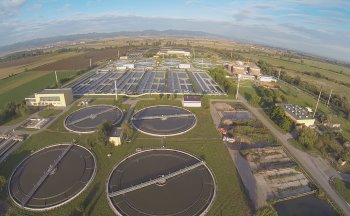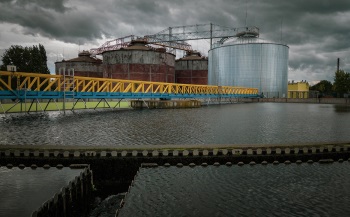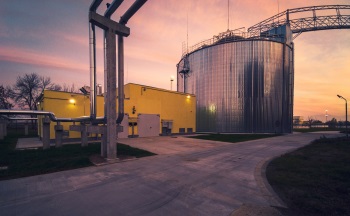Gold standard
Methane Captureand Combined Energy Production Project at Wastewater TreatmentPlant Kubratovo
The project was implemented on the site of the Sofiawastewater treatment plant near Kubratovo, Municipality ofSofia.
 The project objective is the implementation of a system for anaerobicsludge digestion with biogas capture and combustion in thecogeneration installation for the production of thermal and electricpower. The project was initially developed and registered as a jointimplementation project (JI) with the support of the European Bankfor Reconstruction and Development and it was launched on January1st, 2007. A letter of approval was received for the project from the Ministry of Environment and Water of Bulgaria in 2007. A declaration of approval dated 10 July 2007 was also issued bythe Ministry of Economy of the Kingdom of the Netherlands. Initiallythe project was registered as a joint implementation project (JI) under the Kyoto Protocol, Procedure 1, with identification numberBG1000166.
The project objective is the implementation of a system for anaerobicsludge digestion with biogas capture and combustion in thecogeneration installation for the production of thermal and electricpower. The project was initially developed and registered as a jointimplementation project (JI) with the support of the European Bankfor Reconstruction and Development and it was launched on January1st, 2007. A letter of approval was received for the project from the Ministry of Environment and Water of Bulgaria in 2007. A declaration of approval dated 10 July 2007 was also issued bythe Ministry of Economy of the Kingdom of the Netherlands. Initiallythe project was registered as a joint implementation project (JI) under the Kyoto Protocol, Procedure 1, with identification numberBG1000166.
Due to the expiration of the term of the KyotoProtocol - 31 December 2012, the company took a decision to registerthe project for capturing and utilization of methane in theKubratovo Treatment Plant in the voluntary Gold Standard (GS), whichallows revenues from emission reduction. The expected reduction ofgreenhouse gas emissions from the project after its registrationunder the Gold Standard is in the size of 70.276 tCO2e per annum.The project voluntary carbon credits (verified emission reductions – VER) and trades them on the voluntary market.
In 2019 the project was recertified according to the new requirementsof the standard GS4GG (Gold Standard for Global Goals) with an accent placed over itscontribution to the implementation of the UN Sustainable DevelopmentGoals – SDG 13 - Take urgent action to combat climate change, asadditional accent was placed over two of the UN sustainabledevelopment goals - SDG 6: Clean water and sanitation and SDG 11)
(https://www.un.org/sustainabledevelopment/sustainable-development-goals/).
The following general measures were implemented in order toachieve the project objectives and to comply with the EU Directivesfor wastewater and treatment of sludge from wastewater:
Primary settling tanks
The renewed bioreactors are supplied with mixed sludge from theprimary settling tanks and the secondary sludge (surplus activatedsludge) from the biological treatment facility, and then they arepumped into the bioreactor.
Bioreactors for anaerobic sludge digestion
 Тhe installation for anaerobic sludge digestion stabilizes thesludge. With this procedure the organic matter of the sludge isreduced, which also helps to reduce the dry matter from the totalsludge. This process has a positive impact on dimensioning the unitsfor sludge treatment after the bioreactor and also for sludgedewatering and odour elimination.
Тhe installation for anaerobic sludge digestion stabilizes thesludge. With this procedure the organic matter of the sludge isreduced, which also helps to reduce the dry matter from the totalsludge. This process has a positive impact on dimensioning the unitsfor sludge treatment after the bioreactor and also for sludgedewatering and odour elimination.
After the completion of theprocess of decomposition of sludge, it is dewatered and used as asoil enricher.
Raw sludge pumping station
Five new frequency regulated raw sludge pumps were installed inthe existing pumping station as part of the project.
Sludge circulation system
In order to reheat the raw sludge and maintain the temperature ofthe process under mesophilic conditions (35°C), a new system forcombined sludge circulation and heating was installed in thebasement of the new servicing building. 6 centrifugal pumps for dryinstallation were installed, as four pumps are in operation and twoare on stand-by regime for urgent cases.
Heat exchanger
Theanaerobic process is realized under mesophilic conditions, whichmeans in temperature variation between 33 and 37°С. The freshinflowing raw sludge has to be heated up until reaching the neededtemperature conditions. Also, the loss of heat of the bioreactorshould be compensated. For this purpose, a heat exchanger for eachbioreactor was installed.
The methane obtained in the wastewatertreatment plant is captured in a gas holder, serving as a buffer,and then it is supplied to the cogeneration modules, which on theirpart decrease the electric power purchased from the grid and alsothe diesel fuel used for heating. In case of excess of electricpower, it is transferred to the transmission network.
The project has been implemented in twostages:
 The anaerobic process is realized under mesophilic conditions,which means in temperature variation between 33 and 37°С. The freshinflowing raw sludge has to be heated up until reaching the neededtemperature conditions. Also, the loss of heat of the bioreactorshould be compensated. For this purpose, a heat exchanger for eachbioreactor was installed. The methane obtained in the wastewatertreatment plant is captured in a gas holder, serving as a buffer,and then it is supplied to the cogeneration modules, which on theirpart decrease the electric power purchased from the grid and alsothe diesel fuel used for heating. In case of excess of electricpower, it is transferred to the transmission network.
The anaerobic process is realized under mesophilic conditions,which means in temperature variation between 33 and 37°С. The freshinflowing raw sludge has to be heated up until reaching the neededtemperature conditions. Also, the loss of heat of the bioreactorshould be compensated. For this purpose, a heat exchanger for eachbioreactor was installed. The methane obtained in the wastewatertreatment plant is captured in a gas holder, serving as a buffer,and then it is supplied to the cogeneration modules, which on theirpart decrease the electric power purchased from the grid and alsothe diesel fuel used for heating. In case of excess of electricpower, it is transferred to the transmission network.
The project has been implemented in two stages:
Tothe existing 4 anaerobic digesters, in 2020 an additional reactor ofthe same capacity was built, but with modern equipment. As a resultof that the capacity of the system was expanded, which at the momentconsists of 5 bioreactors in total, 7000 m3 each. Also, a flareincineration system for methane was installed, consisting of 2 х DN150 flares.
Construction of three new cogenerationmodules GE JMS 320 GS-B.LC, each with electrical power of 1063 kWand thermal power of 1088 kW, for the production of electrical andthermal energy in the incineration of biogas.
The bioreactorsconstructed under the project have been in operation since 1 January2007. During the first period of the Kyoto Protocol (01.01.2008 – 31.12.2012) the project passed four verifications and emissionreduction units (ERU) were issued equal to a total of 403,796tCO2e.
Following the registration of the project under the GoldStandard in 2013 and by August 2020, the size of the generatedVoluntary Emissions Reductions (VER) is around 425,000 tCO2e.
Commentsand recommendations regarding the subject of the public discussionheld can be sent to the e-mail address stated at the bottom of thepage:
E-mail: goldstandard@sofiyskavoda.bg
Telephone:+ 359 2 812 25 30; +359 2 813 29 20
Contact person:
Jelyaz Rangelov
DeputyDirector Sewerage Services and Wastewater Тreatment
Fordetails on The Gold Standard Foundation please refer to info@goldstandard.org
 Софийска вода
Софийска вода